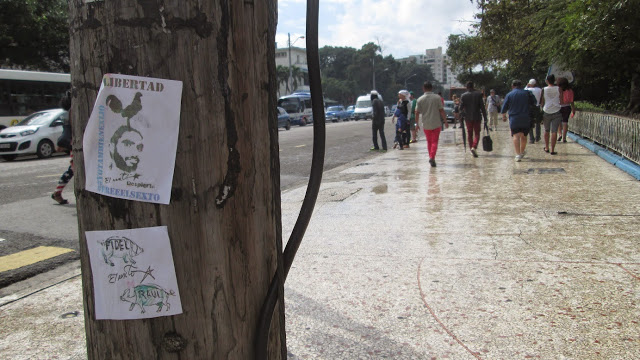Free El Sexto!
by Orlando Luis Pardo Lazo / February 27, 2015 / No comments
Among a people humiliated into applauding its own ugliness, nothing is punished as mercilessly as beauty.
The Cuban government hates him. The secret police (the Revolutionary government’s paramilitary arm) hate him. The government’s official artists hate him. Cuban art may even hate him. And he deserves it, because nobody is more hated among slaves than the free man or woman. Among a people humiliated into applauding its own ugliness, nothing is punished as mercilessly as beauty. And nothing is more dangerous than the truth in a nation that lives on in a claustrophobic atmosphere of lies.

- Is it worth-while to focus on the last images and letters coming from the inside of the last living utopia on Earth? Is Cuba by now a contemporary country or just another old-fashioned delusion in the middle of Nowhere-America? A Cold-War Northtalgia maybe? Can we expect a young Rewwwolution.cu within that Ancien Régime still known as The Revolution? I would like to provoke more questions than answers.

- Orlando Luis Pardo Lazo was born in Havana City and still resides and resists there, working as a free-lance writer, photographer and blogger. He is the author of Boring Home (2009) and is the editor of the independent opinion and literary e-zine Voces.
In contrast, Cuba does not deserve him: It does not deserve the awe-inspiring talent of the graffiti artist Danilo Maldonado Machado (known as El Sexto). Having sprayed his name so many times across the streets of Havana, he is perhaps more El Sexto than anything else now—the only place you will find his Danilo Maldonado Machado alias is on his criminal record.
In fact, after countless threats, intimidation and illegal arrests, El Sexto has been held in custody in Cuba since December 25, 2014 awaiting trial for attempting to stage a performance that never actually took place. His arrest was an act of vengeance—a warning signal to the rest of Cuba’s ever-decreasing cultural circles.
The objective seems to be to keep El Sexto off of the streets for as long as possible. It’s State Security that paints over the graffiti of El Sexto, while its agents have torn off his clothes in the middle of the street to stop him from exhibiting the political art on his clothes, before El Sexto decided to tattoo those icons on his own skin. And now they are finally getting rid of El Sexto, an artist dedicated to the Cuban pro-democratic movement at a time when even the United States is condoning a dictatorship that has not allowed a single one of its citizens to vote in over half a century. In reality, Cuba’s transition today seems to be heading toward a Castroism without Castros. Or perhaps just a Castroism with second- or third-generation Castros.
El Sexto had painted two live piglets in Cuba’s typical olive-green military colors. He had then taken it even further, painting the names “Fidel” and “Raúl” on their sides—both names are common on the island, but are most recognizable as the names of the Castro brothers, who have been in power since 1959. El Sexto then covered them with butter to make both little animals slippery to the point of being uncatchable. He had planned to let them loose in the middle of Old Havana’s Central Park. His aim was to provoke a carnivalesque reaction from his compatriots, the day after most Cubans had consumed huge quantities of pork at their traditional Christmas Eve dinners.
“Animal Farm, in memoriam” was the name of this performance, which was aborted before it could be brought to life. El Sexto was subjected to a violent arrest, pulled over by the police cars and motorcycles that had been openly watching and following him for almost a month. It seems he will be charged with inciting public unrest and with contempt, even though none of this actually took place. In Cuba’s narrative, historical fact rarely gets a look in.
Two months have now passed since El Sexto was interned at Cuba’s sinister Valle Grande prison, but he has still not been brought to trial. His family have not even been given the date of the hearing. In Cuba, even injustice is inefficient to the point of insulting. The Cuban state is the sole proprietor of its people’s time.
El Sexto is asthmatic and has had some worrying moments in a prison that is as damp as it is lacking in reliable medical care. However, he has miraculously been brought back to life in absentia on the streets of Havana. A sea of posters has been appearing on the city’s lamp posts, walls and buildings, demanding freedom for our “graffiti-artist-in-chief.” These posters feature a touch of humor and demand heaps of courage—any protesters caught posting up campaign fliers to demand El Sexto’s release would almost certainly find themselves imprisoned by the reigning gerontocracy.
In a letter smuggled out of the prison, El Sexto himself describes the situation better than any Cuban writer could: “None of my crazy plans would have been possible if I hadn’t known that I was not alone and that I have the support of so many of you. It is possible to fill hearts up with hope. Evil will never triumph over good. Reactionary minds will never triumph over free minds. Violence will never triumph over art and reason. Death will never triumph over life and love. I live happily because I live without fear. Though they may persecute and harass my family, they will never make a single dent in my creativity.”
It is time for solidarity with El Sexto: “Graffiti artists of the world, unite!”





